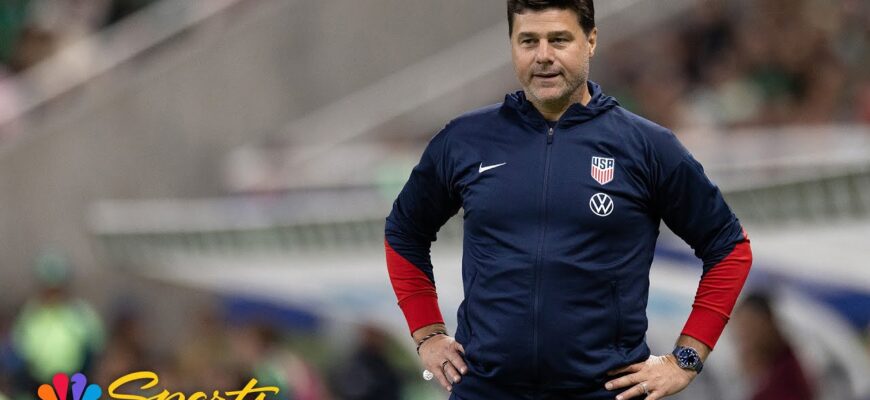The dust has barely settled on the Concacaf Gold Cup final, where the United States Men`s National Team (USMNT) had to concede their regional crown to rivals Mexico. Now, the focus swiftly shifts from regional supremacy to global aspirations, with the 2026 FIFA World Cup on home soil looming large. In a critical international window, the USMNT, under the strategic guidance of Mauricio Pochettino, is set to face two formidable Asian opponents: South Korea and Japan. These aren`t mere exhibition matches; they are indispensable proving grounds.
A Reunion on the Global Stage: Pochettino vs. Son Heung-Min
Adding a compelling narrative layer to the upcoming fixture against South Korea is the reunion between USMNT head coach Mauricio Pochettino and his former Tottenham Hotspur protégé, Son Heung-Min. Their relationship, forged over years of Premier League battles and Champions League heroics, is one of mutual respect and admiration.
“It`s going to be an amazing opportunity to see each other. We really love each other. [He] was a very important player… When we moved to Tottenham, we chased him again and we convinced [him] to join us… his relationship in Tottenham is one of the best players in the world. He`s an amazing player, but he`s an amazing person and unbelievable, and yes, it`s going to be really, really nice,” Pochettino expressed, reflecting on their history.
This personal connection, however, will be temporarily set aside when the whistle blows. Pochettino, known for his demanding yet innovative tactical approach, will be tasked with devising a plan to contain Son, a player he knows intimately. For Son, representing the 23rd-ranked South Korea, this match offers a chance to demonstrate his world-class talent against a team led by a former mentor, adding an intriguing dynamic to the friendly.
The Stakes: More Than Just Friendly Encounters
For the USMNT, these September fixtures are far from inconsequential. Following a series of less-than-convincing performances under Pochettino’s tenure – including losses to Mexico, Panama (twice), Canada, Turkiye, and Switzerland – the pressure to deliver a statement performance is palpable. With the 2026 World Cup co-hosted by the U.S., Mexico, and Canada, the host nation needs to cultivate a squad capable of deep tournament runs, not just participation.
South Korea, ranked 23rd globally, and Japan, positioned 17th, represent the calibre of opposition the USMNT will need to overcome on the biggest stage. This international window is perhaps one of the most competitive outside of a major tournament, offering Pochettino a critical opportunity to assess his player pool. The coach has spoken of a desire for “organized chaos” within his system, aiming for unpredictability. This requires players who can adapt, innovate, and perform under duress.
Squad Assessment: Who Rises to the Occasion?
Pochettino has assembled an experimental squad, blending established talents like Christian Pulisic, Tyler Adams, and Sergiño Dest with promising young players such as Noahkai Banks and Diego Luna. The objective is clear: identify who can not only survive but thrive in high-pressure situations. Every pass, tackle, and decision made on the field will be scrutinized, as players vie for a permanent place in the World Cup plans.
The return of key players like Pulisic and Dest is particularly significant. Pulisic, often the creative engine, will be expected to reignite the team`s attack, while Dest`s defensive stability and attacking prowess from the flanks are crucial. This period is a test for Pochettino to put players in positions to succeed, and for the players themselves to seize the moment, demonstrating the resilience and ambition required to compete at the highest level.
Beyond the Scoreline: Building Confidence and Cohesion
While the outcome of the South Korea match (and the subsequent game against Japan) will inevitably draw headlines, the true measure of success lies beyond the scoreline. It`s about building tactical cohesion, fostering team chemistry, and instilling confidence. A strong showing, even if it doesn`t result in two victories, could provide the necessary impetus to shed the lingering doubts from previous results.
The match against South Korea is slated for Saturday, September 6th, at Sports Illustrated Stadium in Harrison, New Jersey – a familiar setting that offers a slight home advantage. The eyes of the soccer world, particularly in North America, will be on this encounter. Will Pochettino’s “organized chaos” materialize into a defining performance? Or will the questions surrounding the USMNT’s consistency persist?
As the clock ticks closer to 2026, every international break becomes a crucial chapter in the USMNT`s narrative. These friendlies against strong Asian opposition are not just games; they are foundational steps on the long and challenging road to World Cup glory, a journey where every player`s contribution, and every coaching decision, carries significant weight.









